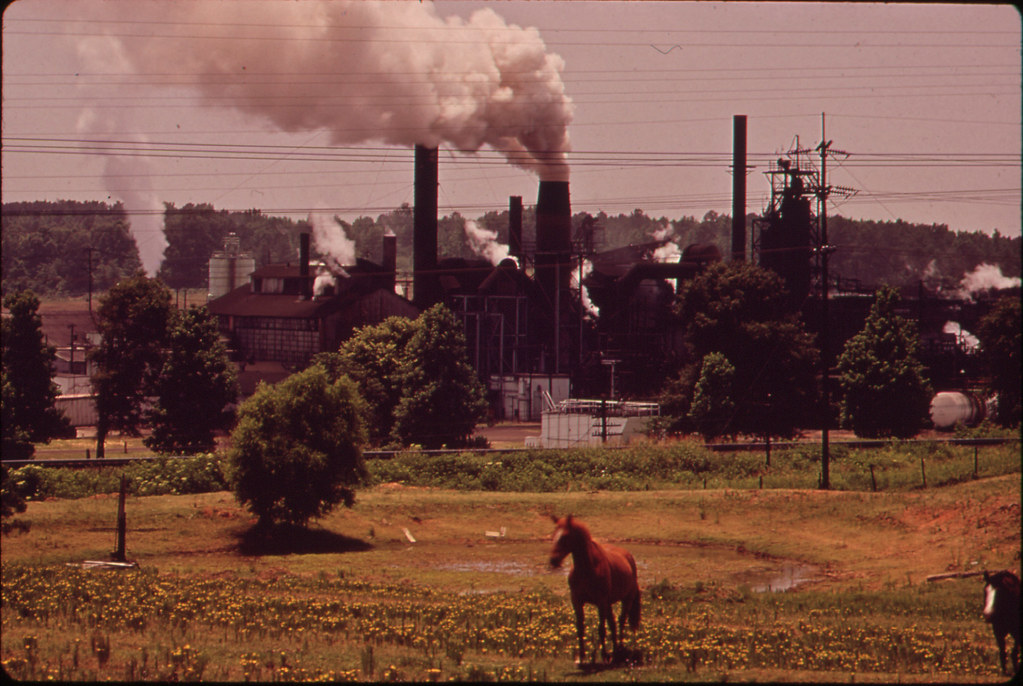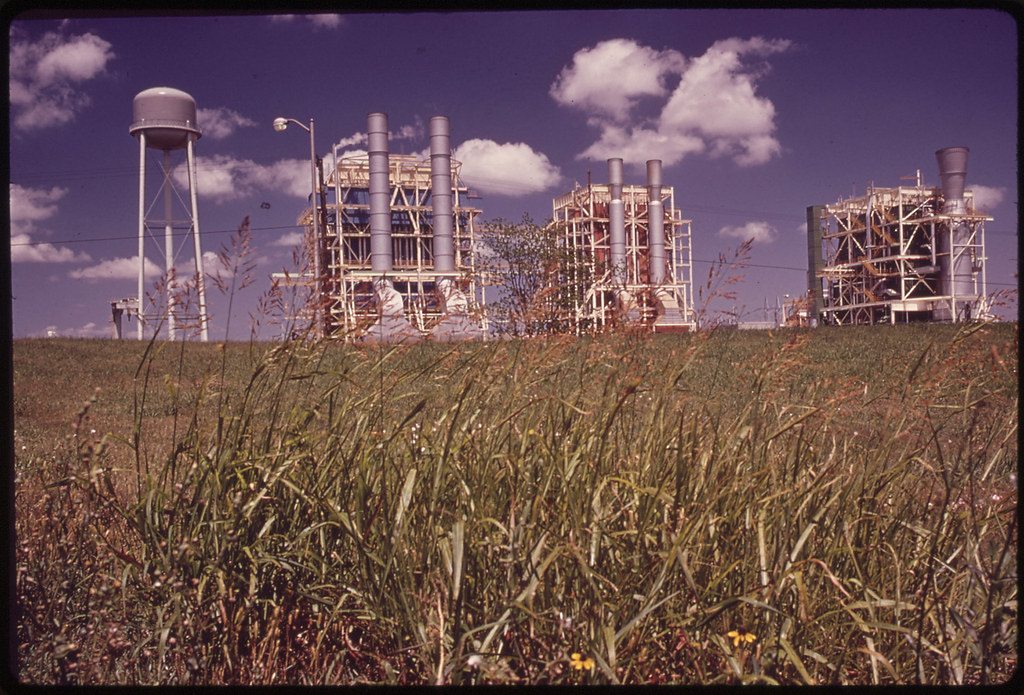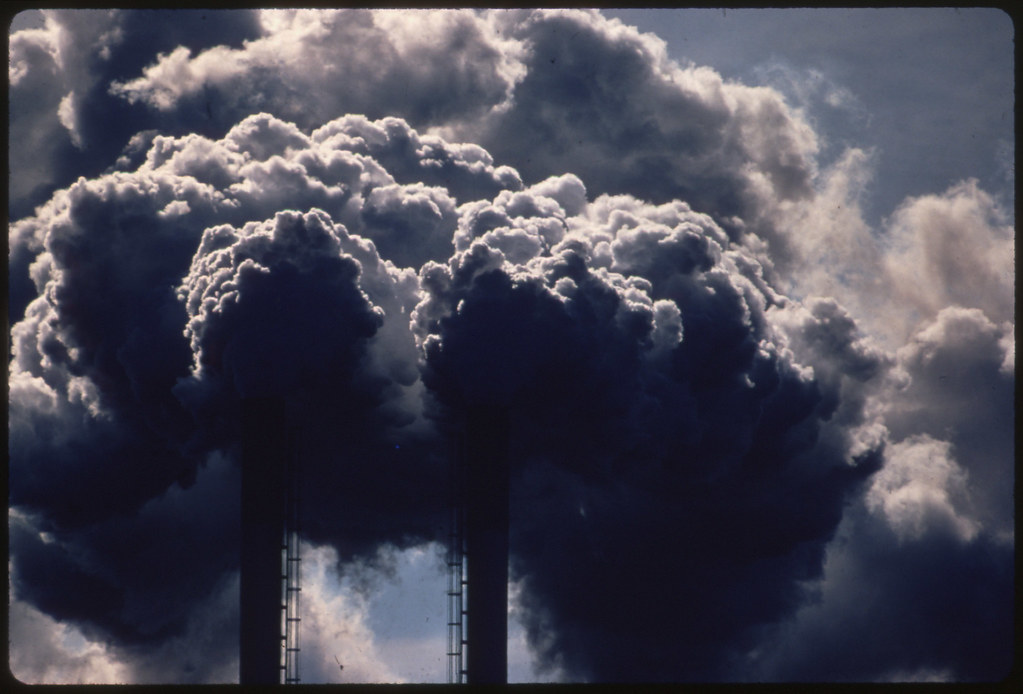.

Children play in yard of Ruston, Washington home, while Tacoma Smelter stack showers area with arsenic and lead residue: photo by Gene Daniels, August 1972
It's hard to tell the clouds
from the smoke
without a truth
filter
To shelter
in place
down
wind of the smelter
might once have worked
but there are no longer
places to hide
from the smoke
without a truth
filter
To shelter
in place
down
wind of the smelter
might once have worked
but there are no longer
places to hide

The Atlas Chemical Company belches smoke across pasture land in foreground, Marshall, Texas. The plant Is referred to as "Old Darky" in the community because black soot from the plant covers everything near-by. One farmer claims he lost several cows due to soot and chemicals from Atlas: photo by Marc St. Gil, June 1972

Chemical plants, New Orleans: photo by Marc St. Gil, c. 19733

Burning discarded automobile batteries, Houston, Texas: photo by Marc St. Gil, August 1972



17 comments:
Let's shelter in place, then, my friend.
Ack, what am I saying! I've just breathed!
(Of course they never meant to inconvenience the neighbors.)
That tall smokestack toward which the children in Gene Daniels' photo appear to be running was at the time the photo was taken the largest in the world. Its burden of toxic damage done, it no longer exists.
The Tacoma Smelter, Ruston, Washington
"The Tacoma Smelter furnace was fired up on September 12, 1889 and began melting metal ores to extract copper, lead, and arsenic that were easily shipped by water and rail but contaminated the surrounding area. The smelter was known for its tall 562 foot smokestack, which sent pollutants up and away from the smelter into surrounding communities. While the smelter was permanently closed in 1986 and the stack demolished in 1993, the environmental damage was already complete. The American Smelting and Refining Company (ASARCO) operated a copper smelter on the shores of Commencement Bay in Ruston, near Tacoma, Washington for almost 100 years. The facility began its life as a lead smelter in 1889, and was converted to a copper smelter in 1902. It was sold to ASARCO in 1905."
That third line has got under the skin.
We've a truth filter right here. Shame we can't spirit the lies, that old soot, away.
And here's what became of the tallest smokestack in the world.
Understood, WB. Alas the ground contamination remains past the toppling of the stack.
Stunning pictures! Not to mention the poem.. I'm always looking forward to seeing your selection of photos from the 70's, Tom, there is something strangely appealing in them. That era, the tone, people, something, I don't know. It sure looks like cloud and smoke will be forever one. And maybe cloud and smoke and us will be forever one too.
And why did I not notice the title before. Particulate....
The Tacoma Smelter--I knew it very well, as I did the gentleman caught in the video from 3.11 to 3.13--my brother, also no longer with us.
Marie,
I believe that period in the early 1970s was both the first time when Americans became conscious of the damage their way of life was doing to their environment -- and of course to themselves -- and the last time when it was still possible to gain government support in documenting that widespread damage. There are some who think that the Documerica project was allowed to happen because any attention turned upon environmental ills was a distraction from attention to the horrific war then going on. In any case the project ended within a few short years... as, coincidentally or not, did the war.
The poem came about six months ago, when I first saw the Marc St Gil photo of the chemical plants in New Orleans, and mistook those clouds for chemical smoke plumes. Ever since, it's been hard to look at the picture without making that mistake. A "duck/rabbit" ambiguity.
Vassilis, your brother!!
Of course it's impossible to read a mind from two seconds of a video, but it appears very much as though that is a man looking up at something he has wanted to see coming down for a very long time.
I'm sticking to this like a leech to a pulsating blood vessel. Particulate is such a nice word, so light when contrasted with the smoke of the photo and poem. It could be 'particulette' in French, which doesn't mean anything but sounds nice.
Particularly-Articulate.
About six months ago, when you wrote this poem and smoke and clouds were duck and rabbit, I was in New Orleans! Maybe I saw those clouds but they were smoke. Or both. Little did I know...
Particulate is one of those unusual long words that despite their extension are so quick and so articulate (well-jointed) that they almost seem to say, very discreetly mind you, Pay no attention to me, so that I may continue to do my proper work.
It becomes even more modest and self-effacing when one detaches the inital "p".
I experimented with this four years ago when dedicating posts to each of the parts of speach.
Not surprisingly, Articles was the humblest of these posts. And appropriately enough, the only comment it received came from a half-wit...
Articles
BTW I too keep coming back to the post, largely because of the power of the top image, surely near the top of my private shortlist of the great photos of all time.
It's got to do (I think) with the spectacular deep saturated cobalt blue of that Kodachrome sky.
Were we to see this same image in black and white, I'm sure the emotional tonality would be different.
The apocalyptic feeling the photo seems to project must have to do with the shock and surprise of that contrast of the celestial with the dreadful. I think this happens on the instinctive, intuitive level.
Post a Comment